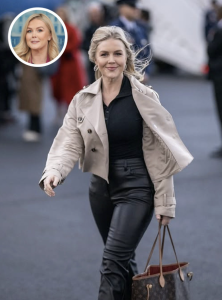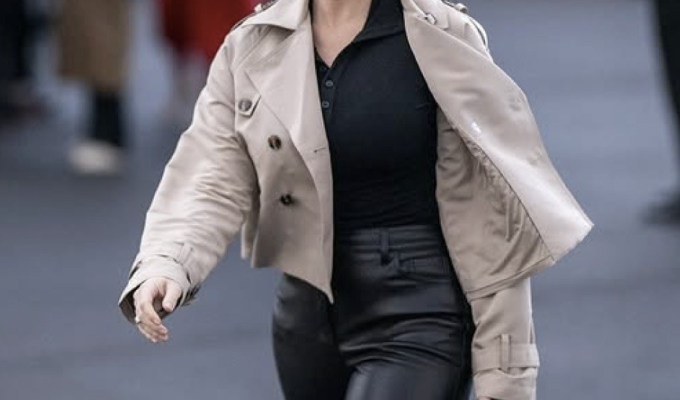White House Press Secretary Slammed After People Spot Small Detail in This Photo She Shared
In the age of viral scrutiny, even the smallest detail can ignite a firestorm. That’s exactly what happened when White House Press Secretary Karoline Leavitt shared a photo of herself walking into the West Wing—confident, polished, and unmistakably political. But it wasn’t her words or her role that sparked backlash. It was a handbag.
The image, posted to her personal Instagram account, was meant to be a behind-the-scenes glimpse into her life as the youngest press secretary in American history. Dressed in a hot pink tweed dress and matching heels, Leavitt exuded poise. But eagle-eyed viewers quickly zeroed in on the accessory dangling from her arm: a Louis Vuitton Neverfull MM tote, retailing at over $2,000.
The timing couldn’t have been more ironic. Just days earlier, Leavitt had made headlines for her fiery rebuke of a French politician who suggested the Statue of Liberty should be returned to France. “My advice to that unnamed low-level French politician would be to remind them that it’s only because of the United States of America that the French are not speaking German right now,” she said. “They should be very grateful to our great country.”
Her words were bold, unapologetic—and to many, deeply contradictory. Critics pounced on the juxtaposition: slamming France while flaunting one of its most iconic luxury exports.
The Internet Reacts: Irony in High Definition
Social media lit up with commentary. “Why have a Louis Vuitton bag if everything from France is so bad?” one user posted. Another wrote, “She’s slamming France while carrying their most famous export. That’s rich.”
The backlash wasn’t limited to political opponents. Even some of Leavitt’s supporters expressed confusion. “I love her message,” one follower wrote, “but the optics here are messy.”
Others defended her, praising her style and professionalism. “Absolutely stunning representation of our country!” one fan commented. “Young, intelligent, and absolutely stunning. It’s so refreshing to see!”
But the debate had already taken on a life of its own. The photo became a symbol—of political irony, generational branding, and the blurred line between personal taste and public messaging.
Fashion as Political Language
Karoline Leavitt’s style has long been a subject of public fascination. As a Gen Z figure in one of the most visible roles in Washington, her wardrobe choices are dissected as part of her political persona. Critics have accused her of dressing “too old” for her age, citing her preference for conservative cuts and monochromatic palettes. Supporters argue that her wardrobe reflects maturity and respect for the office she holds.
But this latest controversy wasn’t about age—it was about alignment. Can a public figure criticize a country while flaunting its luxury goods? Is it hypocrisy, or simply the reality of global consumer culture?
The Louis Vuitton bag became a metaphor. For some, it represented the contradictions of modern politics. For others, it was just a purse.
A Deeper Look: Identity and Transformation
The debate also reignited interest in Leavitt’s visual evolution. A resurfaced photo from her pre-Washington days—taken at a 2023 Celtics playoff game—showed a very different version of her: white jeans, green tank top, sandals, and a cork purse. Her hair was straight, her skin sun-kissed. She looked like any other young woman enjoying a night out.
Now, she’s polished, poised, and unmistakably political. The contrast is stark, and it’s led some to speculate about the influence of her surroundings—and her marriage to 60-year-old real estate developer Nicholas Riccio.
“27 pushing 68,” one commenter joked. Another wrote, “Ahh look, another grandma outfit for her old man!”
The comments were harsh, but they reflected a broader curiosity: Who is Karoline Leavitt, really? And how much of her public image is shaped by the roles she’s expected to play?
The Personal Amid the Political
Amid the noise, Leavitt remained silent on the controversy. Instead, she posted heartwarming snapshots of her weekend with her young son. One photo showed him helping her bake muffins. Another captured him being pushed in a stroller by his great-grandmother.
These images offered a counter-narrative: a woman balancing public duty with private joy. They reminded followers that behind the podium and the headlines is a mother, a wife, and a person navigating intense scrutiny.
And perhaps that’s the real story. Not the handbag. Not the dress. But the tension between image and identity, between public expectation and personal truth.
What This Moment Reveals
The viral photo and its fallout reveal more than just a fashion faux pas. They expose the layers of meaning we assign to public figures. In a polarized landscape, every detail becomes a symbol. A handbag becomes a referendum. A dress becomes a battleground.
Karoline Leavitt’s photo was meant to be a moment of confidence. Instead, it became a mirror—reflecting the contradictions, expectations, and complexities of modern political life.
And whether you see hypocrisy or humanity, one thing is clear: the smallest details often carry the heaviest weight.


